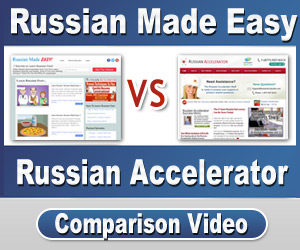Order Food In A Russian Restaurant
Listen To Entire Episode
Exercises Only
Welcome to episode number 7. Let’s practice saying two new Russian words. These are two of the most common words in the language. So, repeat after the speaker:
есть …again… есть
[NOTE: I’ve chosen to not sound out the Russian words in these transcripts using English letters. If you’d like to be able to read Russian (it can be learned in just a few days) I’ll include a link at the bottom of this transcript to my course on reading Russian.]
If I were to sound that out using English letters, I’d spell it y-a-y-s-t….есть
Listen one more time: есть
And now try this one:
хорошо
…one more time…
хорошо
It’s long overdue, but let me finally talk a moment about the rolled R in Russian. If you’re having trouble try saying “udder”….udder…See how your tongue bounces off the roof of your mouth? That’s how a rolled R feels. So this new word…
хорошо
…in super-slow motion would be: hо-UDDER-sho
We also have that very Russian X sound. It’s almost like you’re clearing your throat, I mean, as if to spit. (demo). I know…it’s a little gross. But you do need a touch of that in there. Xuh
One more time, slowly: ho-UDDER-show
And quickly, from a native speaker:
хорошо
All three vowels there are the letter “o” by the way, but in Russian, only one O per word can be pronounced as an “oh.” The rest sound like “uh”.
Try our two new words again:
есть….хорошо
Alright. As those seep into your sub-conscious, let’s review the material from podcast 6.
You’ve just been seated in a cafe and the waiter is ready for your order. Greet him, and say:
I’ll have coffee, please.
Здравствуйте, я буду кофе, пожалуйста.
How should you thank him when he brings it?
Спасибо.
To which he will reply:
Пожалуйста
Now wait a second. What does пожалуйста mean? Please or You’re welcome? Well, hopefully you recall that it literally means ‘please’, but it’s also used as a response when someone thanks you because you’re telling them PLEASE…there’s no need to thank me.
Пожалуйста
Now, looking at the menu, you notice a photo of some food item that looks like pasta. And, like so many foreign foods, the word is a cognate in Russian. Listen:
Паста
So point to the picture and ask the waiter with just two words:
Is this pasta?
Это паста?
How will he say: Yes, this is pasta.
Да, это паста.
So tell him:
I’ll have the pasta, please.
Я буду пасту пожалуйста.
Did you remember to say “pastu”…with an “uu” sound at the end? Remember, by ordering pasta we’re doing something to the word. And so its “ah” ending has to change to “uu.” If you’re still shaky on that, it might be worth reviewing the previous podcast, number 6. But if you got it right and said pastu, honestly, you’re doing great!
So, do you recall those two words we started the podcast with?
есть
хорошо
Let’s see if you can figure out what they mean.
Pretend I’m at my Russian friend’s apartment. As he heads into the kitchen, he asks me if I want a beer. I know he usually has a big selection of beers in his fridge, so listen to our conversation:
Есть Хайнэкэн?
Да, есть.
Хорошо. Я буду Хайнэкэн, пожалуйста.
Let’s try a similar example, but with soft-drinks. My girlfriend is standing by her refrigerator and asks if I want a soda. I know she has all sorts of soft drinks, so I ask her…
Есть Спрайт?
Да, есть.
Хорошо. Я буду Спрайт, пожалуйста.
Do you kind of have a feel for how those two words might translate? Here’s that first conversation in English:
“Is there Heineken?”
“Yes, there is.”
“Okay, I’ll have a Heineken, please.”
So, есть translates as “is there” or “there is” depending on if you’re using it to ask a question or make a statement. But super-literally, it translates as “there exists”. As in:
“There exists Heineken?”
“Yes, there exists.”
Awkward sounding, for sure, but important to know.
And what about that other word, хорошо? Well, that can translate a number of ways. In these examples it’s used like the English word “okay”.
“Okay, I’ll have a Heineken.”
Хорошо. Я буду Хайнэкэн
The word is also used as a way of agreeing. Like, imagine your wife says, “I think I’ll make soup tonight. Sound good to you?” You’d reply…”Okay.”
Хорошо.
You wanna go to the movies?
Хорошо.
The word has other uses and meanings that we’ll pick up as we go along…хорошо?
Anyway, let’s step back into the cafe and put these words to work for us. So, you’re sitting at the table. You’ve already exchanged greetings with the waitress. So ask her:
Is there soup?
Есть суп?
Listen to her response:
Да. Есть борщ и есть солянка.
So, she said: Yes, there is borscht and there is solyanka.
Since you’re not familiar with that solyanka soup, let’s play it safe and order the borscht. Tell her:
I’ll have the borscht, please.
Я буду борщ, пожалуйста.
But if you were feeling adventurous and wanted to try a new soup, how would you say:
I’ll have the solyanka.
Я буду солянку.
Did you remember to change the “a” at the end of solyanka to an “uu” sound? solyanku.
Я буду солянку.
Now, you’re having trouble finding coffee on the menu, so ask the waitress:
Is there coffee?
Есть кофе?
Again, listen to her answer:
Да, есть. И есть капучино.
Tell her:
Okay, I’ll have the cappuchino, please.
Хорошо. Я буду капучино, пожалуйста.
Now, here are two more easy cognates in Russian. Again, they’re foods. Listen and repeat…
йогурт
маффин
So, we say yogurt, and in Russian it’s йогурт with that deep “uu” sound.
And that 2nd one is muffin.
They have a “mah” sound at the beginning. And for that, envision a bluberry muffin, or some other sweet muffin. Think cakey, not bready.
So, imagine your girlfriend has come over for breakfast, but sadly you don’t have much to offer. Tell her…
There’s coffee, there’s yogurt, and there’s a muffin.
Есть кофе, есть йогурт, и есть маффин.
V.O. And now, here’s your Tip of the Day from Russian Made Easy…
Today’s tip is quick ‘n’ easy: When you’re in Russia or Ukraine and you’re using your Russian, try asking questions that you already know the answer to. That might sound like a dumb thing to do, or a waste of a person’s time, but it’s not. Because — since you already know the information — you can relax and focus all your attention on listening to the native speaker. When I was is Moscow, for example, I’d stop people on the street from time to time and ask how to get to Red Square….again, even though I knew exactly how to get there — because I wanted to analyze their answers, and their word choice, and so on, without that stress of, “Man, I gotta make sure I remember all this.”
So that’s the tip of the day: From time to time, ask questions you already know the answer to.
Alright, let’s put it all together now:
So, you’re in a cafe and the waitress comes over. Start by greeting her:
Здравствуйте.
You’re hoping to hear that same greeting, but instead she says:
Добрый день. Что Вы хотите?
Gulp! Well, don’t panic. She used a different greeting: Добрый день.
And then she followed with: Что Вы хотите?
…as she pulled out her pad and pen.
So, we haven’t learned all those words, but we have encountered ЧТО, remember? In Podcast 5 we learned to point at something and ask:
What is this?
Что это?
So, ЧТО is the Russian word for “what”.
So when the waitress pulls out her pad and pen and asks Что Вы хотите?
She’s asking, WHAT….something something. And it’s a safe bet she’s asking What do you want? or What would you like? She obviously wants to know your order. So let’s ask her:
Is there soup?
Есть суп?
How will she say:
Yes, there is. There is borscht and solyanka.
Да, есть. Есть борщ и солянка.
Tell her:
Okay, I’ll have the borscht, please. And coffee.
Хорошо. Я буду борщ, пожалуйста. И кофе.
Change your mind. Tell her…
No, I’ll have the solyanka.
Нет, я буду солянку.
She says: Solyanka? Ok.
Солянку? Хорошо.
Tell her: Thanks.
Спасибо.
And she says: You’re welcome.
Пожалуйста.
That was kind’ve fun. Let’s try another one. The waiter comes over, so greet him:
Здравствуйте.
He, too, uses that other greeting:
Добрый день.
..and then asks you:
Что Вы хотите?
We know he’s asking, WHAT….something something. I don’t want to officially learn this phrase yet. We’ll cover it in a future episode. For now we’re just going to assume he’s asking: What do you want?
Now, imagine that — although it’s 11am — you haven’t had breakfast yet. Let’s ask him:
Is there yogurt?
Есть йогурт?
And here’s his reply:
А…завтрак хотите. Ну…есть йогурт, есть маффин, есть блины…и есть кофе и капучино.
You’ll notice this happens a lot with any foreign language you learn. Native speakers never seem to use the exact phrases you’ve studied. Of course, why would they? The assumption by native speakers is essentially: Well, he knows those words, so he must know these words, too.
But don’t worry. We can deal with this. Let’s first listen one more time to his response:
А…завтрак хотите. Ну…есть йогурт, есть маффин, есть блины…и есть кофе и капучино.
The first four words are new to us. But then he gets to stuff we have learned:
есть йогурт, есть маффин, есть блины…и есть кофе и капучино.
He’s saying:
There is yogurt, there is a muffin, there are blini — blini are those are thin Russian pancakes, basically like crepes — and there is coffee and cappuccino.
So tell him:
Okay, I’ll have the yogurt, please. And cappuccino.
Хорошо. Я буду йогурт, пожалуйста. И капучино.
He reads back your order:
Ok…Yogurt and cappuccino.
Хорошо. Йогурт и капучино
Tell him: Thanks.
Спасибо.
How does he say: You’re welcome.
Пожалуйста.
If you’re comfortable with this kind of exchange, you’ll do great when you visit Russia or Ukraine. Sure, there are tons of foods that we haven’t covered, but there are also so many cognates when you’re dealing with food, it’s easy to get by. Here are six food cognates off the tip of my head. Can you recognize each one? Listen..
Омлет, грейпфрут, банан, гамбургер, хот-дог, спагетти, брокколи
We could go on forever with food cognates. So don’t worry. When it comes to ordering in a restaurant, you’ll do great.
I’ve moved the link to the Read Russian Videos to the sidebar on the right. Check out the Read Russian in 3 Hours links. You can get the free app for i-phone, or Android, or watch the videos online in your browser if you’d like.
Have questions or comments about how to order food in a Russian restaurant? Please feel free to write me at: mark@russianmadeeasy.com
And pick up today’s downloads — the exercises and today’s transcript — at RussianMadeEasy.com
See you next time…
DOWNLOADS – (right click with mouse and “save as”)


Please comment or share with one of the buttons below. Your support helps keep the ball rolling!
p style=”text-align: center;”





Leave a Reply